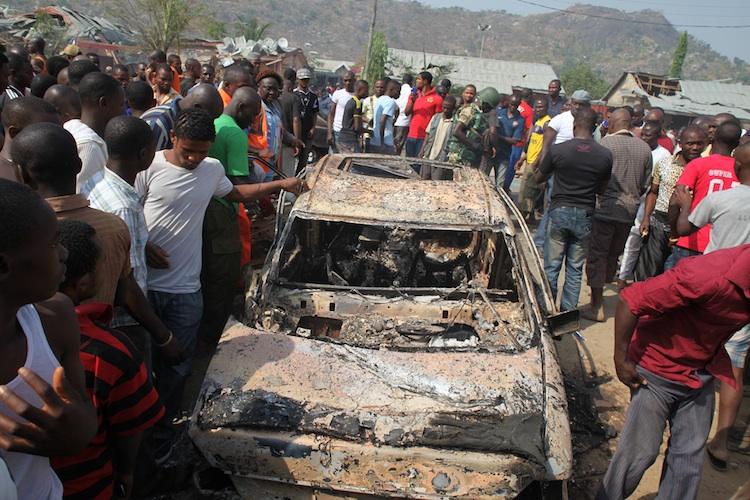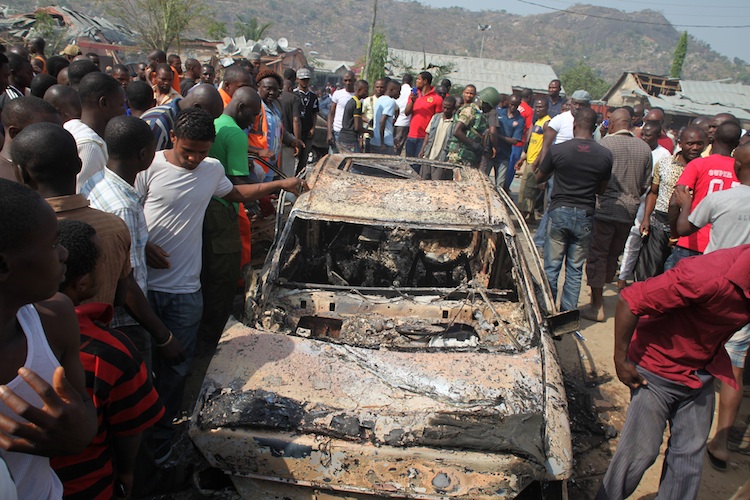After the deadly coordinated Christmas Day bombings in Nigeria, focus is now squarely on Islamist terror group Boko Haram, which claimed responsibility for the attacks. While the group’s recent spate of attacks, including the two churches on Dec. 25, threatens to further destabilize Africa’s most populous nation, some analysts believe they could also pose a threat to the U.S. homeland.
Boko Haram translated is “Western education is forbidden,” but its original name was Jama‘atul Alhul Sunnah Lidda’wati wal Jihad, which means “People committed to the propagation of the prophet’s teachings and jihad.”
It started out as a religious study group, which morphed into a “live off the land”-type of Islamist movement in the early years of the new millennium, after it found a charismatic leader in the man Mohammed Yusuf.
Boko Haram settled in a remote area of northwest Nigeria. The movement was influenced by the Afghan Taliban, to the point that they called themselves the Nigerian Taliban and dubbed their area Afghanistan.
After years of low-level conflict with local police and other residents, a bloody standoff ensued in 2009, after which Mohammed Yusuf was killed (extra-judicially, according to rights groups) by security forces while in custody, and the group’s members were either killed, arrested, or went underground.
In 2010, however, the group resurfaced as a terrorist network and has since carried out a string of attacks killing an estimated 400 people.
Western Targets
Recent developments have caused analysts to question if Boko Haram has evolved into a group that threatens not only the secular government in Nigeria, but also Western interests.
Previously, the group’s attacks had been directed against the Nigerian government, and leaders, including Muslims, perceived to be corrupt or co-opted by the secular government under southern Christian Goodluck Jonathan.
In August, that changed when the United Nations office in the capital city of Abuja was attacked, killing 23 people and injuring 80. This marked the first time the group had struck an international target.
Prior to the attack, Boko Haram had been largely unknown by the American intelligence community, according to a Nov. 30 report by the U.S. House of Representatives Committee on Homeland Security, Subcommittee on Counterterrorism and Intelligence.
“The attack … capped off an evolution in the capabilities of Boko Haram, beginning in the mid-2000s, from attacks with poisoned arrows and machetes to sophisticated car bombings,” says the report titled “Boko Haram: Emerging Threat to the U.S. Homeland.”
Of particular concern, are the group’s ties to other Islamist militants that could lead to an attack outside of Nigeria. The congressional report sites intelligence that members of Boko Haram have been trained by al-Qaeda in the Islamic Maghreb (AQIM), and that they have links to the Somalian group al-Shabab.
“This cooperation, combined with the increased sophistication of attacks executed by Boko Haram, have led to concerns from the U.S. Intelligence Community over the sect’s intent and capability to strike Western targets in Nigeria, throughout Africa, and most importantly, the U.S. homeland,” reads the report.
It is unclear how the group is organized, how well it is organized, if it has any kind of central leadership, and if it consists mainly of old Boko Haram members or is more of a grass-roots insurgency.
Demands made in the name of Boko Haram have ranged from enforcement of Islamic law across northern Nigeria (where it is already officially in effect in several states) and the release of jailed Boko Haram members, to the overthrow of secular government.
The subcommittee recommends that the United States step up intelligence gathering on Boko Haram, so as not to underestimate the group, and determine whether it should be declared a foreign terrorist organization.
It also advises the United States to collaborate with the Nigerian government in anti-terrorism efforts.
North-South Divide
John Campbell, former U.S. ambassador to Nigeria, believes that collaborating on anti-terrorist efforts may not provide the solution.
He argues that the well-known heavy-handedness of the Nigerian police and security forces (which stand accused by rights groups of many human rights violations) have so far only exacerbated the north-south divide, which is rooted in poverty and corruption.
Boko Haram grew out of the extreme poverty and corruption in Muslim northern Nigeria, by promising a better, more just society through Islamic law. It also grew out of the strong sectarian divide in the country.
Nigeria, like most African countries, was carved out on a map by a colonial master, Britain, and is comprised of ethnic groups with little in common. The north is traditionally mainly Muslim and pastoralist, while the southern ethnic groups were animist farmers, who mostly converted to Christianity.
Ethnic and religious tensions have flared up now and again in postcolonial Nigeria, especially along the north-south border. There has been bloodshed with religious overtones before, and Boko Haram is not the first Islamic group to emerge.
Campbell thinks the United States should focus on urging President Jonathan, who has so far purely treated Boko Haram as a security issue, to address the legitimate grievances of the northerners, and, if he refuses, instead create closer diplomatic ties and exchange with the north, so as not to alienate the country’s 75 million Muslims.
“Jonathan needs to address this northern alienation, of which Boko Haram is only a symptom,” he wrote in an article in Foreign Affairs on Sept. 9.
The subcommittee report also agrees, “Active public outreach to Nigerian Muslims plays a critical role in containing Boko Haram.”






